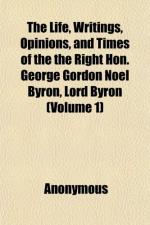|
This section contains 3,764 words (approx. 13 pages at 300 words per page) |

|
SOURCE: "The Byronic Pilgrimage to the Absurd," in The Midwest Quarterly, Vol. XV, No. 4, Summer, 1974, pp. 325-65.
In the following essay, Hinkel contends that Byron's poetry reflects his continuing attempts to come to terms with a world he considered chaotic and meaningless.
In 1821, only three years before his death, Byron wrote in his diary: "It is all a Mystery. I feel most things, but I know nothing except—." He then covered the page with a series of blanks. The best of Byron's poetry is variation on that theme. The theme assumes nearly as many different emphases as the poet assumed poses, but the recurring motif, from Childe Harold's Pilgrimage through the fragmented Canto XVII of Don Juan, asserts an essentially absurdist view of the world. In one sense, Byron was born out of phase with time. While Coleridge and Wordsworth affirmed the organic unity of life and the...
|
This section contains 3,764 words (approx. 13 pages at 300 words per page) |

|


